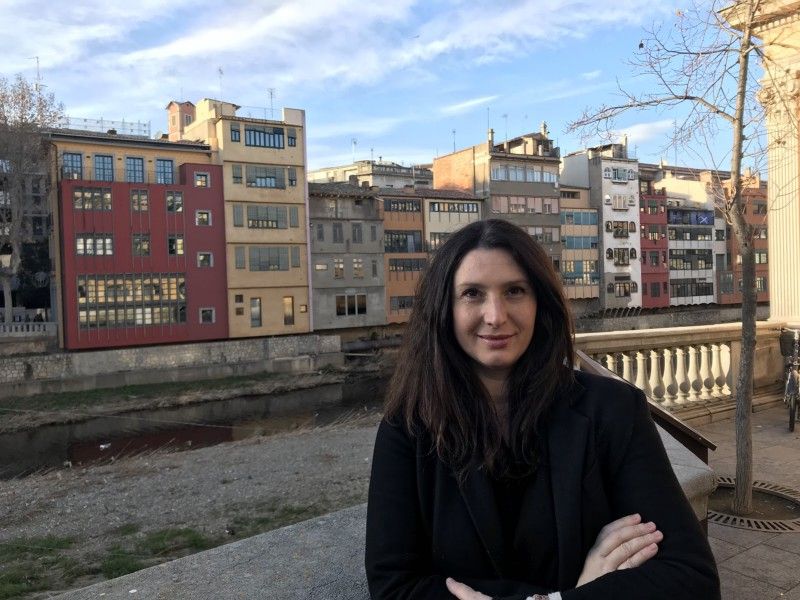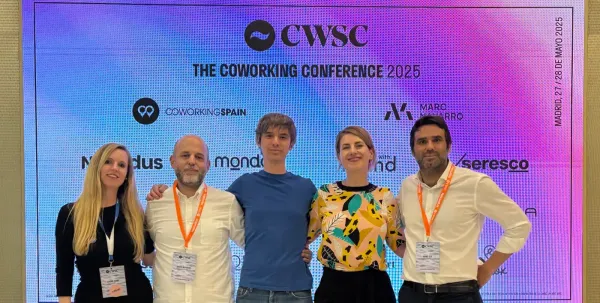Puedes leer este artículo en castellano aquí
On the 24th and 25th of April the Coworking Spain Conference will take place in Alicante, and the Cobot team is eagerly anticipating attending the 8th year of this conference to share and learn from the vibrant and diverse spanish coworking scene.
Coworking in Spain
City with the most coworking spaces: Barcelona*
Population: Urban 4,8M / Metro Area 5,7M *
Number of coworking spaces: 370 in Barcelona* / 1547 in Spain*
Average monthly coworking rate*: $220 / month (192€ / month)

Celeste Senés defines herself as the co-founder of CoEspai in Girona, Spain. As in many other examples, CoEspai was born out of a personal need. Back in 2012 Celeste was searching for a space in which to work, but the only options she found were either to rent an office for herself or share one. But she was unhappy with both of those options. In her research, she discovered betahaus Berlin, and since nothing similar existed in Girona she decided to create something herself.
CoEspai, in addition to a coworking space, participates in the European Creative Hubs Network. “A creative hub is a space, platform or project that dynamizes, expands, or is related to creative and cultural companies. CoEspai has a multi-fold interest in this field; on one hand many members of our community work in this sector, and on the other hand we have a room for exhibitions and presentations. We’ve hosted presentations on annual exhibition cycles and also offer exhibitions scholarships.”
Since 2018, Celeste has been the Sponsorship Manager of the Coworking Spain Conference (CWSC). “The CWSC is where the managers take the opportunity to discover new trends in the sector: what works, what doesn’t; where global trends are heading; new spaces and their managers; but above all it gives people the opportunity to share problems they experience on a daily basis with others who have the same issues, and who, perhaps, have already found a way to deal with them successfully.”
After seven iterations, what does the 8th annual Coworking Spain Conference have in store for us? “We still have the will to be the annual meeting point of coworking managers, but this year we want to open our horizons and make the conference accessible to an international audience by dubbing the content in English.” The past editions of the CWSC have been well received among international visitors but there was an linguistic barrier that Manuel Zea, 2019 conference director, has decided to eliminate. As Celeste tells us: “the content and character of the conference makes it attractive for many European or Latin American markets, but for many, the language was a problem. However, completely reshaping the conference into English was not an option because our authenticity and character would be lost.”
Sponsorships are perhaps one of the least well-known aspects of conferences but they are a key feature of every operation. “When we talk about sponsorships we always have to understand that it is a bidirectional relationship: whether you are a fundraiser or a sponsor, the mission, vision, and values must be aligned with your strategy. On the other hand, both parties have to be clear about the responsibility that sponsors and organizations have to promote each other.” Many times, Celeste adds, “the fundraiser forgets to help the sale of the product or service of the sponsor, and you must never forget to meet the expectations of the company that is trusting you. It’s not about: ‘I give you money just to get a booth or a logo on your website,’ it’s a much more strategic decision, a long-term collaboration, and that has everything to do with the fit of the vision and mission from both sides.”
We know that one of the important issues for Celeste is the role of women in coworking. “This topic is very complex and extensive, there are several aspects that I think are worth noting. One point that attracted the most attention in the media has been the opening of spaces created exclusively for women. These coworking spaces are gaining traction in several markets, and we have to look at what gave rise to them and how they’re different from other spaces, for example, what kinds of content are they curating for their members, or if there are different strategies in their community dynamization, space design, or any other factors in their operation.”
If you have been following this series of interviews you know that we always close with the question: what question would you love to be asked and you have never been asked? In this case, Celeste warns us that she doesn’t have a perfect answer to her question: What is the real weight of the small coworking spaces within the economy of the sector? She explains “if we look at the industrial sector in Catalonia, small and medium-sized companies carry huge weight. When I ask myself about the weight of those considered small, I think the result would surprise us and I think we could establish parallelism with these data of the industrial sector.” In fact, if we look at the latest data published by Coworking Spain, which showed that 3% of the spaces considered large (of more than 1000m2) control 30% of the square meters. 70% of the Spanish market is in the hands of the 97% of invisible spaces (those with surfaces less than 1000m2). Although it would require an adjustment for a multitude of factors, it gives us a clue as to the volume that these spaces could have in the total. “It always has more repercussion when one of the big ones settles in a city, but we should put just as much focus on the spaces already there, because their activity might surprise us.”
Once we reached this topic it became impossible to ignore one of the most pressing questions about the difference between the turnover of small and large spaces: “it depends on several factors: the business plan, your costs, where you put the value, and whether you focus on the people who manage it or in the metrics.” Although it is true that in large spaces you can save certain costs, there are other metrics like staff per member ratio that tend to slip. When spaces scale their hired staff often remains equal, which leads us to wonder if the level of dedication to our members is the same as for spaces with double or triple the community dedicated staff/member ratio. In this way, one of your higher costs (after rent) is reduced. “If one of the added values is the management of people then it would be appropriate to consider if these spaces are actually offering the same level of quality.”
For those of you who have read this far, we have some good news for you. Coworking Spain Conference has given us a discount code of 10% to share with our readers. When you go to reserve your spot at the conference, use code cobotgivesyou10 to collect the discount.
We like vibrant coworking in all its shapes and sizes. If you visit Girona you can surely find the ideal coworking spot in CoEspai and if you want to know more about good coworking or the Spanish scene, you just have to visit Alicante next April.
Cobot helps coworking businesses around the world effectively manage their spaces. You’ll find that our features can help you run your coworking space more efficiently and grow a healthy, and happy, community. Want to try it out to see how Cobot can help you automate your daily administrative tasks? Just sign up for a free trial or a live demo session and reach out to our support to learn about our available discounts.



